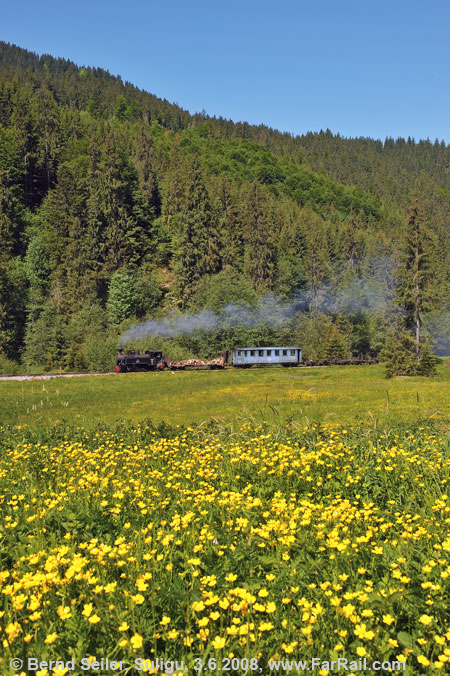

When the first green appears in the valleys and the fruit trees are in blossom, there is often still snow on the top of the mountains, especially in the Făgăraș mountain range. It will probably still be cool in the morning hours, so we will see a nice steam trail. In spring, we are able to visit lines that which are difficult to keep serviceable during winter months. We therefore have five different lines in our program.
We have planned visits to two forestry railways, an industrial railway and two former state railway lines: Vişeu de Sus, Moldovița, Brad, Cornățel and Abrud. However, everyone who comes on this trip must be aware that it may not work out exactly as planned. Winters in the Carpathians are unpredictable, and the masses of snow can prevent us getting through even in April. But since Vişeu also runs logging transport in winter, there is a very good chance that trains can run for us too. In Abrud, however, it could be that the line is still buried under snow and ice. We will then offer an alternative program. As always, we try to make our trains look as authentic as possible. For Vişeu we have the two-axle tender available for two days. On the third day of our visit to Vişeu we will probably run an ordinary production train.
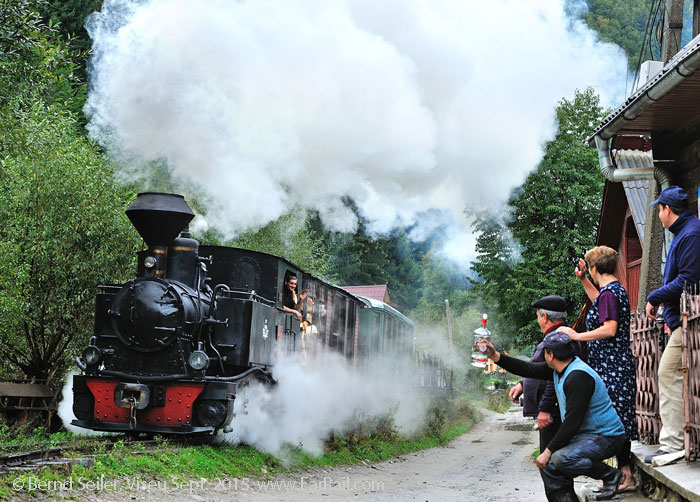
|
Date |
Itinerary |
|
13.04. |
We’ll meet at the |
|
14.04. |
Vişeu – Făina: In the morning (approx. 7.00 am) we steam into the mountains. Today is Sunday, so almost no train will disturb us. We have booked a charter train consisting of empty wagons pulled by a Reşița locomotive, which will take into the mountains with lots of photo stops. Overnight stay either in Vişeu or in a basic accommodation in the mountains. |
|
15.04. |
Făina – Comanu – Vişeu de Sus: In the morning, we will take our train further up into the mountains, as far as possible. In the afternoon we will probably return to Vişeu de Sus with a loaded train (depending on availability). Very few photo stops will be possible, as this will be a normal production train. And it has to roll to earn money. We expect to take two or three photos of the loaded train on the line. Overnight stay in private guesthouses near the depot. |
|
16.04. |
Vişeu de Sus – Cozia – Vişeu de Sus: Today, we want to embark a steam-hauled production train to the mountains, following the diesel train. In doing so, we must consider the scheduled trains and the railcars. It is anticipated that we will only travel as far as Cozia, serving the currently active loading point at the lowermost location, in order to return promptly to Vişeu. There is a possibility that we may only travel as far as Delta Novăț. Nevertheless, we will have numerous opportunities for photo stops. In the evening, we will take a charter bus to Moldovița for our accommodation. |
|
17.04. |
Moldovița: At sunrise (if it indeed makes an appearance), we will travel on a steam-charter train with empty logging trucks to the end of the line, passing by wooden houses and hand operated water wells. An authentic Reşița locomotive will haul our train. Accommodation will be provided in Moldovița. |
|
18.04. |
In the morning, we will embark on an authentic train on the newly re-gauged section from Moldovița to Vatra Moldoviției. The line resembles the many forestry railways that once traversed villages, offering numerous new photo opportunities. In the afternoon, we will travel by charter bus to a hotel in |
|
19.04. |
Cornățel: On the former narrow-gauge railway from |
|
20.04. |
Brad - Crişcior: In the morning, we will embark on a 100% authentic train composition - a Reşița standard locomotive and five or even six self-unloading wagons - on the noteworthy industrial railway from Brad to Crişcior. Around 12:00 noon, we will continue towards Câmpeni, where another narrow-gauge train awaits us: either with a |
|
21.04. |
Individual transfer from the hotel to the airport and return flight from |
The narrow gauge forest railway of Vişeu de Sus is the last remaining one in operation in
The main line starts in Vişeu de Sus, at the large sawmill, and run steadily uphill for 43 km to Coman at the Ukrainian border. All branch lines are now ancient history except a small branch which can’t be explored by steam trains. The line offers plenty of opportunities for good pictures. There are three tunnels very close together but sadly none of them can be photographed in sunshine.
.jpg)
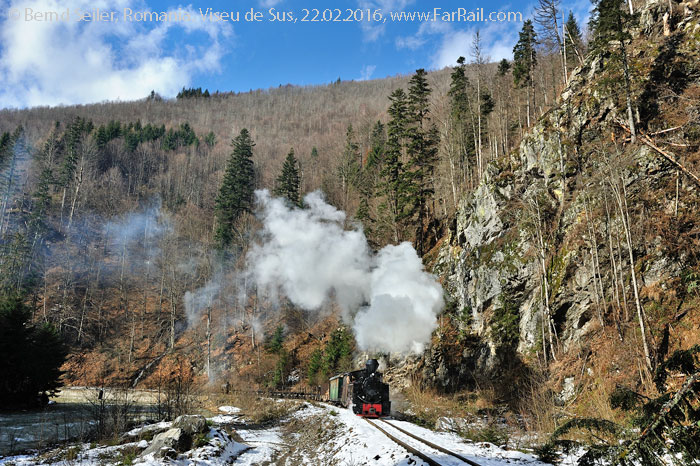
Not only is the landscape something special, the trains in themselves are also really interesting. We will try to make up authentic trains, as they ran in the eighties, when the line belonged to the state run forestry railway CFF (Căile Ferate Forestiere) and when it was worked exclusively by steam locomotives. There are several original coaches back in service, so we are able to haul an authentic passenger train. Besides the locomotive and original four-wheel tender and passenger coach we’ll carry several empty trucks for the logs uphill to the loading points. Sometimes there are forestry tractors or other machinery that will have to be brought up into the forest. This equipment is often carried by the railway as well. We don’t have a direct influence on the train dispatching but our chances of getting an authentic train behind the locomotive are quite good. On our previous trips the train has looked 100% authentic.
What with the intermediate stations, unplanned stops (to raise steam pressure or get one of the log bogies on the track again!) and stops for taking on water, we will have lots of opportunities to take pictures of the train and its surroundings. Lots of shunting activity can be seen as they leave the log bogies at the loading points. In addition we’ve planned some runpasts along the line.
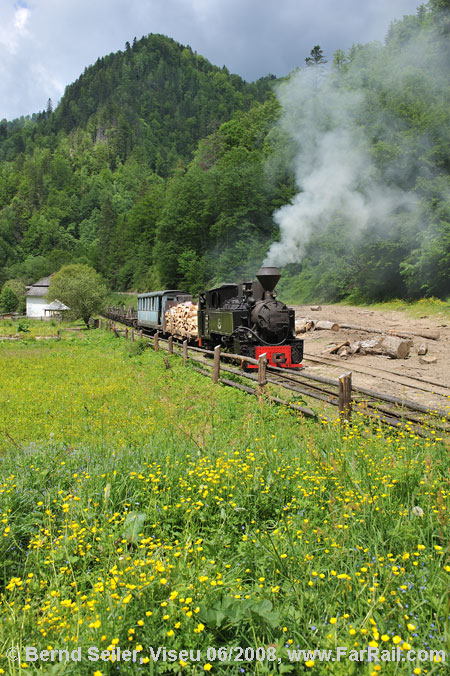

But remember, some things about the tour are unpredictable. Please expect the odd delay, shortages of wagons and couplings for the wagons, derailments, inaccurate or no information and so on. We’ll try to sort all these things out in advance but experience tells us to expect the unexpected. However, things usually work out in a very satisfactory way. So as on our previous trips: we’ll need to arrange things on the spot, try to get the wagons we want and find the best opportunities together with the local railway staff, who will be as helpful as they can be.
We’ll try to get a loaded train and bring it down to the sawmill in Vişeu de Sus. It can’t be promised, but on recent tours we were always able to also photograph a loaded logging train.
Moldovița was a really nice forestry line. In its last years of operation they used a Reşița (764 449) and the 0-6-0 inside frame 763 193 locomotive from Krauss/Munich. The small engine was not only the main attraction of the line, it also was amazing what this little, 50hp engine was able to pull and push uphill over the steep gradients of the line. It’s a little miracle that this unique engine has survived. It’s plinthed in Viseu de Sus. The forestry line was closed and abandoned I a very doubtful condition. However, because of a few railway enthusiasts, in particular Georg Hocevar, the remains were preserved, and with the help of other railway enthusiasts a part of the lower section of the line was refurbished. The length of the line was reduced to two kilometres just before they started to save and preserve it. Now they have rebuilt the first eleven kilometres!
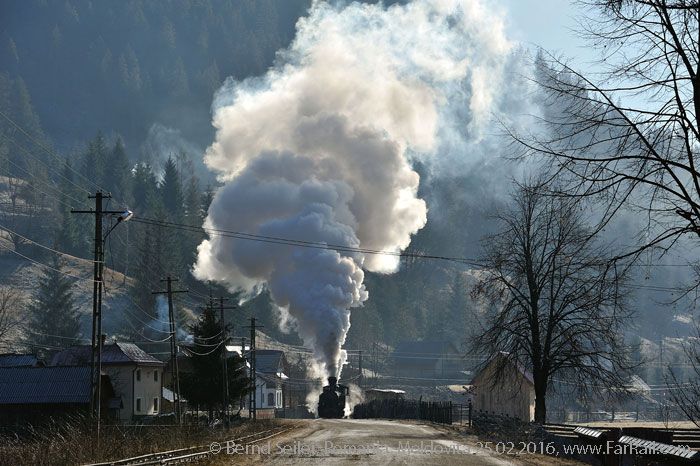
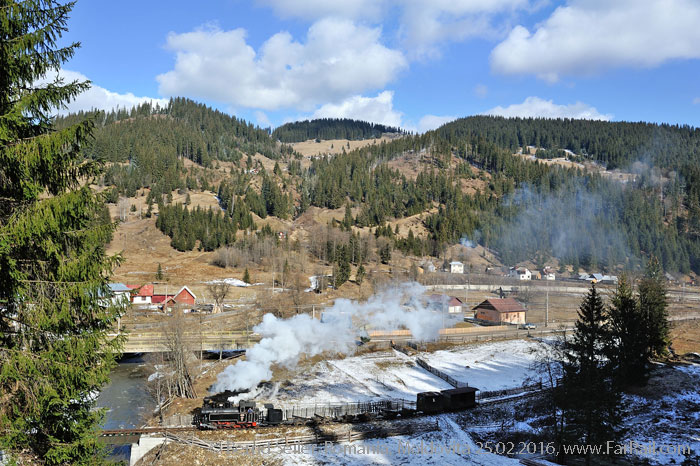
We’ll make a visit to the depot where our loco will be fired. Along the line we’ll pass several old-style wooden houses. Unfortunately, the parallel road has been paved in recent years. However, there are still plenty of nice phot opportunities possible.
Between 1898 and 1910 a 760 mm-narrow gauge, stretching from Sibiu to Sigişoara, was built. It was finally closed in 2001 when only the section from
As the association lacks an operational steam locomotive, we will transport a suitable locomotive from Moldovița via low loader to use it on the line.
Brad – Crişcior is a short industrial line from the state railway station in Brad to an industrial complex for repairing and construction of railway and mining equipment and railway vehicles, in Crişcior. The line leaves the state railway on a curve, passes a river bridge and follows a small road in a populated area. Close to the terminus, a large industrial pipe runs parallel to the line, as was the situation 30 years ago. But in the first section of the line you can take some nice countryside shots. We’ll form a train out of about five coal hoppers and the local Reşița locomotive. This train composition was used for many years in regular service. We’ll travel on the open platforms of the tipper wagons.

The former state railway operated narrow gauge line from Turda to Abrud is still serviceable in the short, but very scenic, section from Câmpeni to Abrud. This part of the line is surrounded by mountains. Especially photogenic are the little, rural villages along the line which haven’t changed much since the last century. A white painted, wooden church is sitting in the valley of the railway – just perfectly placed to include it in the picture. The classic
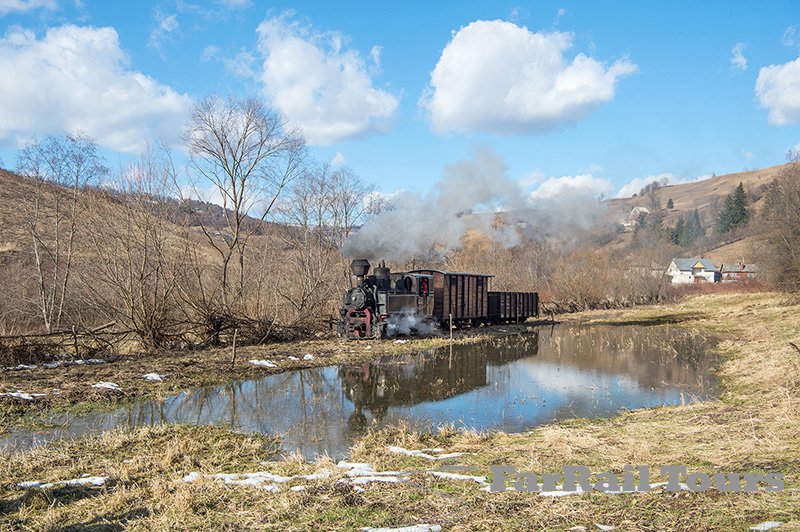
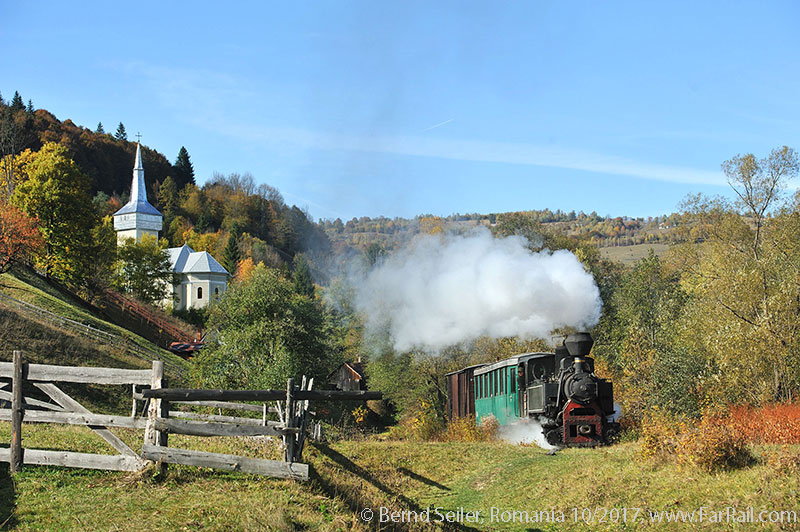
We must also engage the low-loader for this railway and transport both the locomotive and the carriages to the line by road transport.
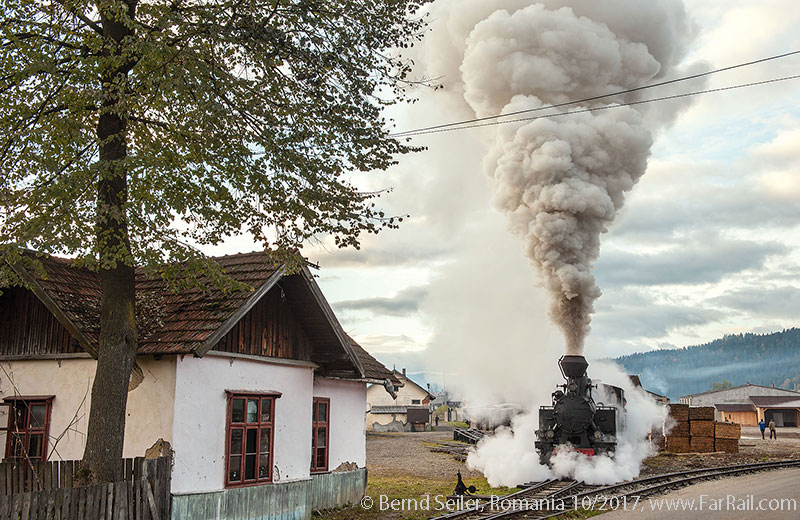
The use of a specific locomotive cannot be promised on any line we’ll visit. In Vişeu we will use steam engines for the regular trains depending on their availability. At the moment we don’t know which steam locomotives will be operational. The engines built by Reşița and Reghin seem to be almost “indestructible”, so the local workshop should be able to solve any problems. For the locomotive in Abrud and in Cornățel, we’ve no substitutes. If the loco fails we can’t offer another one. Because of the high costs of bringing the locomotives to the lines there is also no refund possible if something goes wrong and steam operation cannot be delivered. On this tour we have planned several events which can’t be guaranteed in any respect. Neither horses, nor a manual loading process, or the number of wagons or a specific locomotive can be guaranteed.
In our pensions and hotels there are sufficient power supplies for battery charging. In our accommodation in the mountains, there is neither cell phone signal nor internet available.
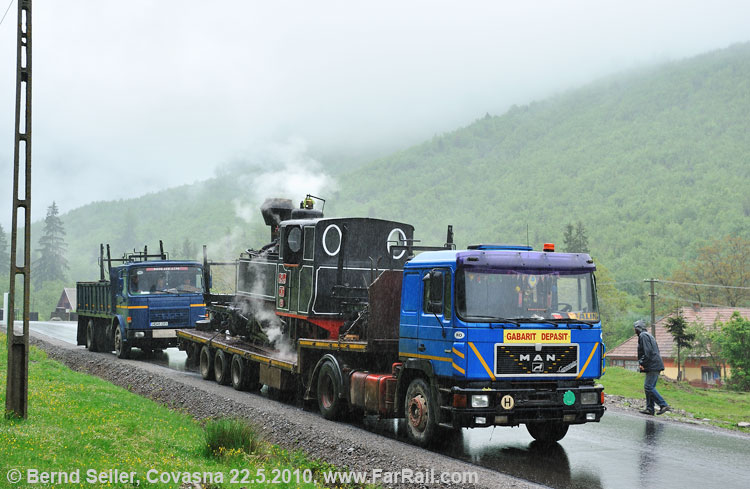
Health: no problems exist concerning your health. The water from the numerous springs along the line in Viseu can be drunk without a problem; even the small streams just above the first village have clear and drinkable water. The only serious health risk is if you are not careful around an operating railway!! Jumping up or down from moving trains is not allowed. Getting on or off, and travelling on the train is at your own risk, so take care along the railway. Wear good sturdy shoes.
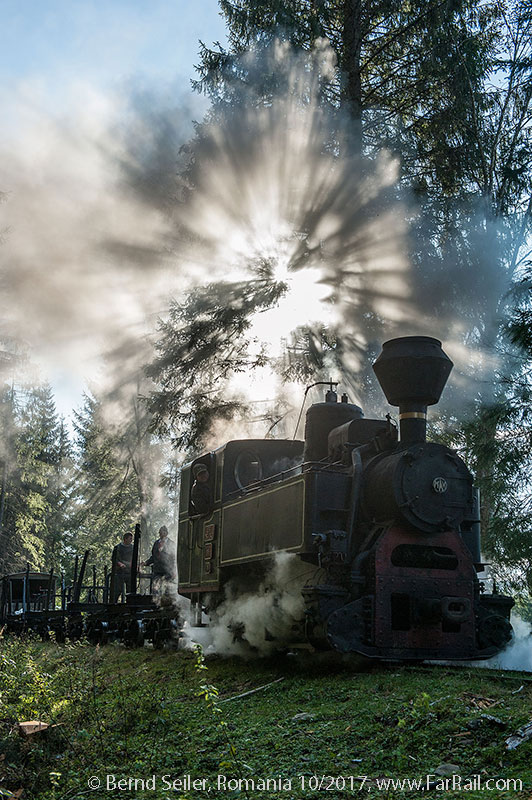
For this tour you will need a valid passport, EU citizens only a valid ID card. A visa for citizens of the European Union is not necessary. For citizens of other countries please contact your local Romanian embassy for details.
You’ll need little local currency. Food, if not included, and beverages are quite cheap. In Vişeu we’ll probably have some things on the train, including hot coffee.
The tour is planned with the dedicated photographer and videographer in mind.
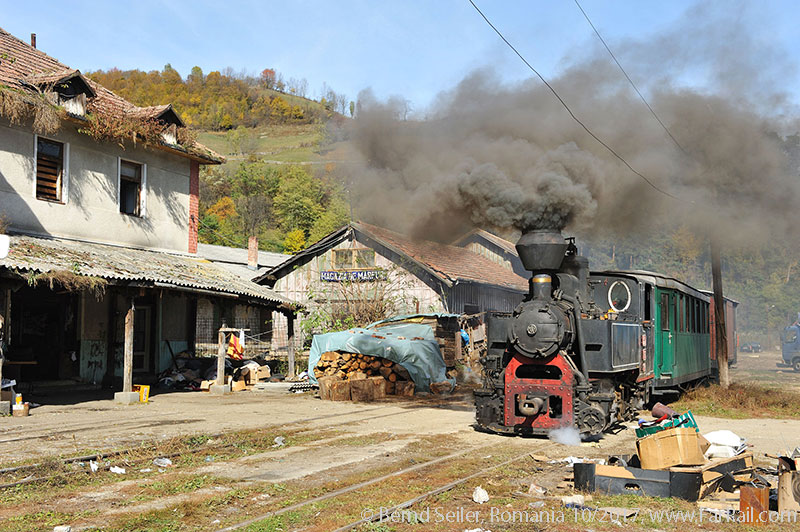
Please remember that the accommodation, buses and the forest railway itself do not necessarily conform to current EU-standards. That’s exactly one of the reasons why we are going there. Safety and environmental standards are still not fully developed so a word of warning - please beware of the dangers in and around the railway and other modes of transportation. An accident and health insurance policy covering foreign countries is essential including of course trip cancellation provisions should you not be able to travel at the last minute. Neither FarRail Tours nor the local operators can be held responsible for any accidents, delays etc.
| Romania | ||
| Narrow Gauge Steam on five lines | 18 to 30 participants | £2,240 |
| 13.04.2024 – 21.04.2024 | Single room surcharge | £195 |
| Registration Deadline: 04.02.2024 | ||
The price includes:
Not included are: